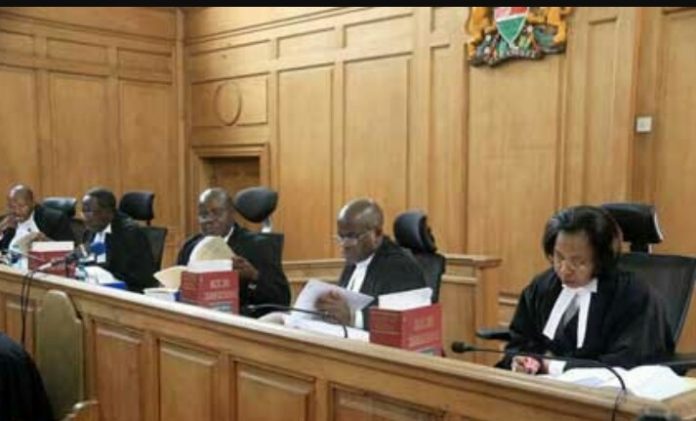
BY SAM ALFAN.
Independent Electoral and Boundaries Commission (IEBC) has suffered a major setback after the Court of Appeal affirmed that results announced at the presidential election results as announced at the constituency level are final.
Returning officers posted in the 290 constituencies are required to electronically transmit results for the presidential contest to the national tallying centre in Nairobi for formal announcement by the Chairman of the Independent Electoral and Boundaries Commission (IEBC), Wafula Chebukati.
The EIBC boss will only be required to declare the winner of the presidential race through formal certification and notify the Chief Justice in writing about the outcome of the August 8polls.
The newly-elected Governors, Senators and Women Representatives will be announced at the County headquarters while results for Members of Parliament and Members of County Assemblies (MCAs) will be conveyed in constituencies.
The three-Judge Appellate bench in their 87 page ruling said the recent restructuring of electoral laws had provided for elaborate procedures to curb poll fraud and spelt out stiff punishment for offenders. Parliament had put in place measures to cure mischief to safeguard election results that were previously at risk of widespread manipulation,“ Justices Asike Makhandia, Kathurima M’Inoti, William Ouko, Patrick Kiage and Agnes Murgor said.
They said the IEBC Chairman had no power to unilaterally tally, verify, confirm and declare presidential results or to arbitrarily overturn the decision made by voters. Further, a few individuals could not be trusted with absolute discretion to handle the presidential results, they said.
The National Super Alliance (NASA) supporters and civil rights activists greeted the judgment against the IEBC in song and dance outside the Supreme Court premises. The petition had been filed in the High Court by activists Maina Kiai Khelef Khalifa abnd Tirop Kitur.
The Court of Appeal upheld the April 7 decision by High Court Judges Aggrey Muchelule, Weldon Korir and Enock Chacha-Mwita that results of the presidential race should be announced by returning officers and are not subject to confirmation by anyone else. In any event, the returning officers were required by law to keep safe custody of all election materials for at least three years in case of any election petitions.
The Appellate bench recalled that it was a criminal offence for anyone to mutilate or destroy election materials. Offenders risked Sh500,000 fine or five-year jail-terms in default.
The second-highest court in the land said the IEBC leadership had no power to confirm, approve or alter the outcome of the presidential vote after returning officers had tallied the ballots, declared the results and transmitted the final results to the national tallying centre in Nairobi.
By purporting to confirm the results, the Judges observed, the IEBC leadership was usurping the role of returning officers in direct conflict with their powers under the Elections Act.
The court dismissed arguments by the IEBC and the Attorney General, Prof. Githu Muigai, that the chairman of the national electoral agency was specially designated as the national returning officer for the presidential poll with the responsibility of overseeing and declaring the outcome after tallying and verifying results from across the country.
The Appeal Judges recalled that the former IEBC Chairman, Hussein Hassan had explained to the special committee co-chaired by Senators Kiraitu Murungi and James Orengo that the previous electoral regime was cumbersome and susceptible to manipulation. The committee had made sweeping recommendations for fool-proof safeguards that resulted in amendments to the Elections Act.
In the contested judgment, the High Court had held that the caveat that presidential election results at the constituency level are provisional and must be re-evaluated by the IEBC headquarters in Nairobi offends the Constitution since any complainant it at liberty to mount a challenge through election petitions.
The three-Judge bench had ruled that Sections 39 (2) and (3) of the Elections (General Regulations) Act 2012 were in conflict with Articles 86, 87 and 138 of the Constitution by purporting to exclude the presidential poll results from those of Governors, Senators, Women representatives, MPs and MCAs.
This means manipulation of the presidential votes will become a tall order.
We will publish the copy of the ruling later.






